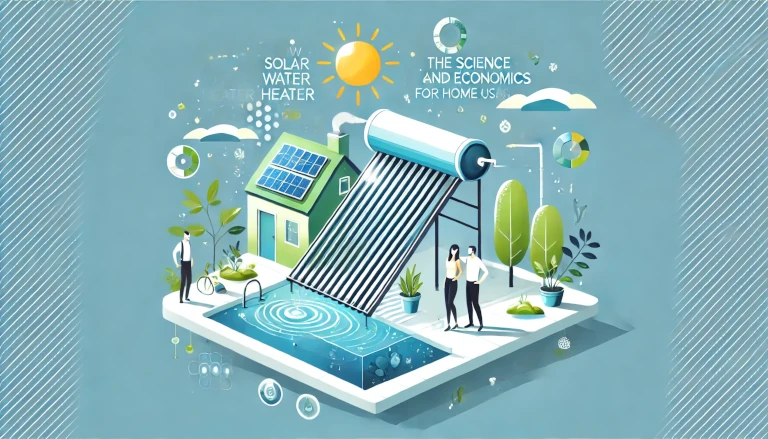Solar water heaters are an increasingly popular choice for households looking to reduce energy bills and promote environmental sustainability. Understanding how solar water heaters work, the science behind them, and the economic benefits can help homeowners make informed decisions about adopting this green technology. In this blog post, we’ll break down the science of solar water heaters, explain their efficiency, and show how they can save money in the long run.
How Solar Water Heaters Work
Solar water heaters use energy from the sun to heat water for residential use, reducing the need for electricity or gas. The system typically consists of solar collectors, storage tanks, and circulation systems that work together to provide hot water for everyday use.
There are two main types of solar water heating systems: active and passive.
- Active Solar Water Heaters: These systems use pumps to circulate water through solar collectors where it is heated by sunlight. The heated water is then stored in an insulated tank until it is needed.
- Passive Solar Water Heaters: These systems rely on natural circulation (without pumps) and are usually more cost-effective, but slightly less efficient.
Both systems capture solar energy through solar collectors (usually placed on the rooftop) and transfer that heat to the water in the storage tank, which can then be used for household purposes like showers, dishwashing, and laundry.
Example: A typical household in a sunny region can reduce its water heating bills by 50-80% by using a solar water heater, according to energy efficiency estimates.
The Science Behind Solar Water Heaters
The primary principle that drives solar water heaters is the greenhouse effect, where sunlight passes through transparent materials (like glass) and heats the liquid inside a collector. This heat is absorbed by a dark surface (usually black tubes or plates) in the collector, which in turn heats the water circulating through the system.
- Flat Plate Collectors: These are the most common type of solar collectors. They consist of an insulated box with a transparent cover and a dark absorber plate that captures the sun’s energy.
- Evacuated Tube Collectors: These are more efficient than flat plate collectors and consist of multiple glass tubes, each containing a vacuum to reduce heat loss. This makes them more suitable for colder climates.
Example: For homes in colder regions, evacuated tube collectors are often recommended, as they perform better in lower temperatures, ensuring efficient heating even during winter.
Economics of Solar Water Heaters for Home Use
- Initial Costs:
The initial cost of installing a solar water heater depends on the type and size of the system. On average, a solar water heater for home use can cost between ₹25,000 to ₹60,000 in India, depending on whether it’s an active or passive system and the size of the water tank. - Energy Savings:
Solar water heaters can significantly reduce your electricity bills. By using sunlight to heat water, homeowners can save up to 60-80% of their energy costs. In areas with high electricity prices, this could result in substantial annual savings. Example: A household that spends ₹15,000 annually on water heating could reduce that cost to ₹3,000 with a solar water heater, translating to savings of ₹12,000 per year. - Payback Period:
The payback period for a solar water heater system is typically between 3 to 6 years. After this period, the system essentially provides free hot water for the remainder of its lifespan, which can be around 15-20 years. - Government Incentives:
Many governments offer incentives and subsidies for installing solar water heaters. In India, for example, the Ministry of New and Renewable Energy (MNRE) provides subsidies on solar water heater installations, which can further reduce initial costs by 30-40%.
Environmental Benefits
Using solar water heaters reduces reliance on non-renewable energy sources like electricity and natural gas. Since they use sunlight—a renewable and clean energy source—solar water heaters produce zero emissions, helping reduce the carbon footprint of households. This not only benefits the environment but also promotes energy independence.
Conclusion
Solar water heaters offer an eco-friendly and cost-effective solution for households looking to cut down on energy costs. By understanding how these systems work, their underlying science, and the financial benefits, homeowners can make more informed decisions about switching to solar energy. With incentives and growing support for renewable energy solutions, solar water heaters represent a smart investment for both your wallet and the environment.
Discover more from Green Ecosystem - Renewable Energy, Agriculture, and Environmental Sustainability
Subscribe to get the latest posts sent to your email.


